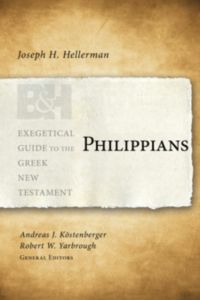⏱️ Estimated Reading Time: 3 min read
Some books in the Bible are quite frankly a joy to read. Many enjoy reading the Psalms and Proverbs. Others gravitate towards Romans or perhaps the Gospel of John. If we are talking about a book that is a joy to read, one cannot forget Paul’s Epistle to the Philippians as after all one of the central themes of this book is joy. What is also a pleasure to read is a helpful commentary that provides significant exegetical insight into the biblical text. If you are looking for such a tool when it comes to Philippians, I recommend Joseph Sellerman’s Exegetical Guide to the Greek New Testament: Philippians, edited by Andreas Kostenberger and Robert Yarbrough.
I will state that as noted in the title of the book, Sellerman’s efforts are mainly spent exegeting the Greek text. This means there is a great deal of interaction with Greek. If you are not used to that or have not spent much time looking at the original biblical languages, do not let that unfamiliarity scare you off from using this book. Sellerman does an excellent job of explaining what terms mean in a way that is useful for both the seasoned exegete and Greek experts as well as for any laymen willing to devote time to studying the text.
This commentary begins with helpful background information on issues of authorship, literary integrity, date and location of writing, why Paul wrote this letter, some linguistic and rhetorical points of emphasis, as well as a useful outline of the book of Philippians. From there, Sellerman then begins engaging the text.
I fully appreciated the manner in which Sellerman not only explains word meanings in the context of Philippians but also how he couches those definitions with salient cultural engagement. To grasp what Paul is saying in Philippians, one has to understand the audience, their issues, the culture in which they lived, and various other important points. Sellerman aptly engages all these relevant subjects and intersperses throughout his exegesis how those issues come to play in our understanding of what Paul is saying in this epistle.
A staple of this commentary series is the excellent bibliography located at the conclusion of each section. Most bibliographies are noted in the back of the book and are not divided into subject areas or the portion of the text where that particular resources much be proven useful. This commentary series takes a different approach, sharing the resource suggestions at the end of each periscope as to what portion of that text they address. I found this to be quite useful.
This is a commentary and a commentary series as a whole for that matter I highly recommend for seminary and Bible college students, pastors, and anyone willing to dig into the meat of the Greek text. I am convinced you will find this to be a valuable resource for years to come and by using this in your studies of Philippians, you will have a much firmer grasp on what exactly Paul was saying to the believers in Philippi so long ago and why it matters for us today.
I received this book for free from B&H Academic and the opinions I have expressed are my own. I am disclosing this in accordance with the Federal Trade Commission’s 16 CFR, Part 255 : “Guides Concerning the Use of Endorsements and Testimonials in Advertising.”




